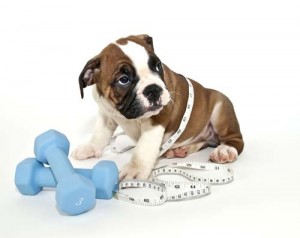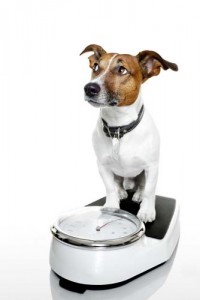Canine obesity is a growing epidemic. The negative health effects of obesity in canines are very similar to those in adults. It is estimated that more than half of the pets in America are overweight. That's a staggering figure.
As dog owners it is our responsibility to help our canine companions stay in shape, and the only person we can blame if they are overweight is ourselves. Helping your overweight dog lose weight won't be easy, but if you stick with it you will both be healthier in the long run.
If you pets feed homemade dog food, check our homemade dog food videos.
Being obese makes your dog uncomfortable and lowers his quality of life. Carrying around all that extra weight puts more pressure on your pet's bones and joints, especially seniors. It's harder for him to move around and lowers the range of motion in his joints as well.
Being overweight causes your pet to get tired faster too. All of these negative effects lower your dog's quality of life, and no pet owner wants that. We want our dogs to be happy and healthy, and helping your overweight dog lose weight is the only way you will be able to give him that kind of life.
What's worse than all of this, is that obesity can be a life-threatening condition if left untreated. If your dog continues to be overweight for a long period of time, it will do damage to his internal organs and could result in an early death.
Overweight pets are more likely to suffer from:
- Arthritis
- Diabetes
- Heart disease
- High blood pressure
- Lung disorders
- Cancerous tumors
- Immune system dysfunction
READ THIS: How To Slim Down an Overweight Dog (+ 30-Day Diet Plan)
Helping Your Overweight Dog Lose Weight
We know the disadvantages of allowing our dogs to become overweight, but what if your pet already is? What can you do to help him? Helping your overweight dog lose weight has a lot to do with diet and exercise, but there are more tips you should be following as well.
The first thing that you need to understand is that if your dog is overweight he is taking in more calories than he needs.
If your dog is obese, you should work with your veterinarian to come up with a weight management plan for your pet. This plan will vary depending on your dog's breed, age, weight and overall health condition.
Your vet will know the correct caloric intake that your dog should have each day, and she can help you decide the most appropriate exercise regiment for your pet.
RELATED: How to Motivate an Overweight Dog
Weight Loss Diet for Dogs
 Odds are, your veterinarian is going to recommend a change in your dog's diet.
Odds are, your veterinarian is going to recommend a change in your dog's diet.
If you're not already feeding a high quality dog food that offers a complete and balanced diet, then you should be. Your vet may also recommend a blend that is specifically formulated for weight management.
All commercial pet diets come with recommended feeding instructions. You need to follow these recommendations based on your pet's ideal weight, which you can obtain from your veterinarian.
This is the only thing that you should be feeding your dog for the time being.
You'll need to decrease your dog's food intake gradually. If you change his caloric intake too quickly it can slow his metabolism, making it even more difficult for him to lose weight. Like with humans, slow and steady weight loss in canines is more likely to provide long-term success.
Your dog's recommended allotment of food will provide him with the calories that his body requires. Any added calories from snacks will just be working against your goal. This goes for dog treats and people food. If you feel the need to add treats to your pet's diet, make sure you reduce his food intake to compensate the added calories.
If you want to feed your dog treats now and again, the dog training treats are best.
Also, remember that the more nutrient dense your dog's diet is, the less food he'll need. These types of foods provide a higher calorie count in a smaller portion. Even though it may not seem like enough, your dog will get the calories that his body requires. Portion control is the biggest key to helping your overweight dog lose weight.
RELATED: The Best Dog Food Storage
Exercise
 Of course, you need to pair a healthier diet with exercise as well in order to help your pet lose weight.
Of course, you need to pair a healthier diet with exercise as well in order to help your pet lose weight.
The added exercise won't just help your pet shed pounds, it will also help to strengthen the muscles in his body that were weakened during the time that he was less active.
One of the most important muscles that exercise will help to strengthen is your dog's heart.
Even light exercise, like leash walking, will help to convert your pet's fat to muscle. This will improve the overall condition of his body and help him shed lb's much quicker.
Muscle does weigh more than fat, so if you're stepping up your pet's exercise routine you may not notice the change in the numbers on the scale as quickly as you'll notice the change in his body structure.
Start out with moderate exercise in small intervals. Instead of taking your pet for a 30-minute walk, take him for three short walks that are 10 minutes each. As his body condition improves, you'll be able to increase the amount of time your pet can exercise without taking a break.
Don't forget to change things up. Your dog will get bored with the same routine just like you would. Play fetch, go swimming or change up the walking trail that you take. This will give your dog new stimulation and keep him motivated to exercise.
RELATED: A Basic Guide to Hiking with Dogs
Other canine weight loss tips
 Here are a few more considerations to help your dog lose weight fast and start today:
Here are a few more considerations to help your dog lose weight fast and start today:
- Have fun! If your dog enjoys exercising with you, he's going to be more motivated. Not to mention, it'll motivate you to get up and get moving too. Exercising with your pet will help you stay in shape also.
- Offer your pet healthy fruits and vegetables as snacks. Treats like baby carrots, apple slices and broccoli will give your dog a little snack, and they also offer many beneficial vitamins and minerals that will keep your pup healthy.
- If you have a senior dog or a dog with hip or joint trouble, try a non weight baring exercise like swimming. It will help him get into shape without putting unnecessary stress on his already aching bones.
- Certain supplements, like omega-3 fatty acids, may also aid in weight loss. Do some research, but you should also speak with your veterinarian about these supplements before adding them to your dog's diet.
Managing your pet's weight is crucial. If your dog is overweight it is vital to get him on a healthier path or he'll likely end up suffering health issues that could have been prevented. If you continue to allow your pet to stay over weight it will take years off his life and lower the quality of life that he has while he's here.
Do yourself and your dog a favor and make the necessary changes to get your beloved pooch on a healthier track.














